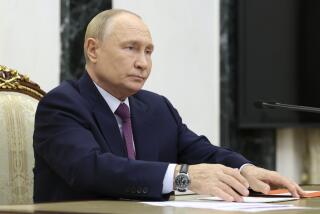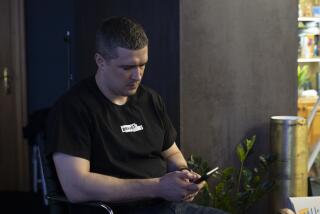Gorbachev Asks New Safeguards on A-Arms Use
- Share via
MOSCOW — President Mikhail S. Gorbachev, alarmed by the rebels’ control of the Soviet nuclear arsenal during last month’s conservative coup, has ordered a review of the country’s strategic command system and new safeguards against another takeover of the weapons, Soviet officials said Friday.
A state commission, made up of top Soviet scientists, political leaders and senior military officers who remained loyal during the putsch, has begun examining whether the conspirators, who allegedly included Gorbachev’s vice president and defense minister, could have evaded present controls and launched a nuclear attack.
The commission’s second task, Gorbachev aides said, is developing a new system to strengthen controls over the arsenal of more than 30,000 nuclear weapons.
“Essentially, we relied on the men who had been put in charge of the weapons,” one of Gorbachev’s science advisers and a commission member said. “The men at the top proved to be traitors; fortunately, the loyalty of the officers further down the ranks was not tested by an order from above to launch.
“We need a system in which the safeguards, technical and human, are as complete, as total, as tamper-proof as possible and able to survive coups, kidnapings and plain mortality.”
Another fear, which the commission is also assessing, is the possible paralysis of the country’s defense capability if the president were truly incapacitated and a rigid chain of command blocked a retaliatory strike in case of attack.
In the political chaos of the coup, the Soviet Union “for those three days had no retaliatory capability,” said Igor Maleshenko, a Gorbachev aide.
Secretary of State James A. Baker III pressed the need for stronger controls over nuclear weapons during his talks here this week with Gorbachev and other top Soviet officials. He received what U.S. officials called firm commitments.
“We did not get a great deal of detail,” a senior U.S. official said Friday after Baker’s meeting with Marshal Yevgeny I. Shaposhnikov, the new defense minister. “But we got something that was very clear--that they intend to maintain unified command and control over nuclear weapons.”
When Gorbachev was held hostage at his summer house in the Crimea for three days during the abortive coup, the KGB security agency cut his communications and brought to Moscow the codes and special transmitter with which Gorbachev would order a nuclear attack, according to Anatoly Chernayev, a foreign policy adviser who was with him.
“They took the big box that can be operated only by the president,” Chernayev recounted later on Soviet television. “Only he has the right to press that very button. Well, this communication box was taken away from him.”
Although Soviet officials have since determined that the plotters never gained control of Moscow’s strategic arsenal, further disclosures have raised serious doubts about the safeguards in the control system over nuclear weapons.
Yevgeny P. Velikhov, a leading nuclear physicist, said he had taken up the issue with Gorbachev and been told that the commission is already reviewing “the procedures and stability of control of nuclear weapons in critical moments--who controls them, what is the procedure.”
“We want to know not only exactly what happened during the days of the attempted coup but what might happen in future moments of crisis,” Velikhov said in an interview here with the Los Angeles Times Syndicate. “We need details. And what did happen, or would happen, with tactical nuclear weapons as well as strategic warheads.”
Velikhov said that the latest comments from Shaposhnikov, the new defense minister, fell far short of providing this kind of reassurance, even for someone with his knowledge of the system and top-secret security clearance.
“He didn’t explain what went wrong, what went right, what must remain secret, what must not,” Velikhov said. “It’s like Chernobyl. Before Chernobyl, there was no public examination of the safety of nuclear power. The Ministry of Nuclear Energy declared, ‘We guarantee that our reactor is 100% safe. No problem.’ After that--a nuclear catastrophe.”
Russian Federation President Boris N. Yeltsin, who was also far from reassured by the comments of Shaposhnikov and other officials, has ordered his government to undertake a study in parallel with Gorbachev’s commission.
“We in Russia decided to maintain a double control,” Yeltsin said in a television interview last week.”We created a special committee for the control over nuclear weapons. This will be a control not only over weapons but over all nuclear installations in general because they are present in submarines, in icebreakers and so forth.”
Russia, the largest Soviet republic, is not seeking functional control over nuclear weapons, Yeltsin later told Baker, but wants to ensure their safe storage on Russian territory.
“Control over strategic nuclear weapons will originate, as it has before, from one center, from a single point”--that is from the central government, Yeltsin said after talks with Baker. “No republic has, or will have, access to control over those weapons.”
Although Shaposhnikov secured similar agreements from the other Soviet republics, Ukrainian nationalists are now claiming nuclear weapons on their republic’s territory as a way of securing international recognition of its independence. An independent Ukraine should “inherit” the weapons from the Soviet Union, they say, and then negotiate their removal and destruction.
While its agenda remains secret, the commission named by Gorbachev is expected to examine the U.S. system of “permissive action links”--high-technology safeguards to control the launch of nuclear missiles.
Gorbachev was particularly shaken by the thought of what the conspirators might have done, according to aides, and has made increased safeguards a priority.
“This plot involved the defense minister, the vice president, the prime minister, the interior minister, the Speaker of Parliament, Communist Party secretaries and the head of the KGB, who was supposed to be watching all the others,” a presidential aide said. “If they could detain the president, why couldn’t they launch a nuclear strike? Only because they were not that mad. . . . The system is not fail-safe.”
During the coup, Defense Minister Dmitri T. Yazov, one of the conspirators, reportedly ordered the testing of a new intercontinental ballistic missile, described as roughly the equivalent of the U.S. Minuteman with a range of more than 6,000 miles.
Gorbachev had barred a test flight while Soviet and U.S. negotiators were completing the new treaty reducing strategic arms, according to Soviet military correspondents; Yazov took advantage of the coup to order the test. But the coup collapsed before the missile could be launched.
Velikhov proposed that the new Soviet legislature, which meets Oct. 2, and the international scientific community follow up the special commission’s study with reviews of their own.
More to Read
Sign up for Essential California
The most important California stories and recommendations in your inbox every morning.
You may occasionally receive promotional content from the Los Angeles Times.














